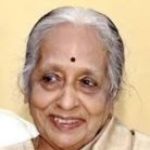Background
Sundaram Krishnamurthy was born on September 12, 1919 in Madras, Tamil Nadu, India to illustrious parents Dr Sundara Reddy and Dr Muthulakshmi Reddy.


(Recent advances in technology have greatly impacted upon ...)
Recent advances in technology have greatly impacted upon the practice of nuclear medicine in general, and the approach to hepatobiliary diseases in particular. Emphasis is now placed more on non-invasive functional imaging with quantification, a feature unique to nuclear medicine and not available from any other competing diag nostic imaging modality. By providing a measure of severity of disease, quantification aids not only in timing of therapy but also for testing whether or not the chosen therapy has achieved the intended goals and objectives.
http://www.amazon.com/gp/product/354065917X/?tag=2022091-20
2000
Sundaram Krishnamurthy was born on September 12, 1919 in Madras, Tamil Nadu, India to illustrious parents Dr Sundara Reddy and Dr Muthulakshmi Reddy.
Sundaram Krishnamurthy passed Bachelor of Medicine and Bachelor of Surgery in 1942 and Master of Science in 1946.
In 1947, Sundaram Krishnamurthy went abroad to work as a Fellow of the Ellis Fischel State Cancer Hospital, Missouri, U.S., and later, at the Royal Cancer Hospital, London.
Right through, he immersed himself in oncology, an interest that was to dictate the rest of his life. He returned to India to serve the cause of poor patients and joined the cancer unit at General Hospital at Chennai (then Madras). In that place he had another parallel battle to fight - against rampant corruption. After an unsuccessful battle against the administration, he later left the place to join his mother’s venture to serve the poor at the cancer institute.
(Recent advances in technology have greatly impacted upon ...)
2000
Quotations:
"In a nation where a large majority speaks of Gandhian values but hardly a handful practices it, the significance of his life and work are monumental."
"Start where I ended and progress to reach greater heights. If you start where I started you are likely to end where I ended which would be self defeating."
From 1965, he was a member of one or more committees of the World Health Organization till 1982. In 1983, he became a member of the Advisory Committee on Cancer Control and Planning of the Central government.

Muthulakshmi Reddy was India’s first woman medical graduate (1912), social reformer and a freedom fighter. She along with two Europeans founded the Women’s India Association (WIA) in 1918. In the 1920s, she fought against the Devadasi system. Incidentally she was the world’s first woman Vice-President of a Legislature (1927). Her younger sister died battling an advanced rectal cancer which at that time was considered to be ‘Karma vyadhi’ (disease of destiny). She started her quest to set up a separate cancer hospital and battled on for three decades to persuade people that cancer was curable. She was later awarded the "Padma Bhushan" in 1956.
